英语倒装句归纳
英语倒装句的归纳总结
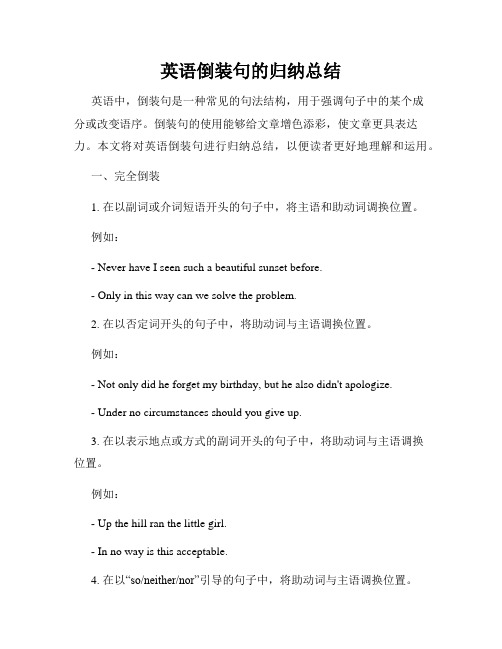
英语倒装句的归纳总结英语中,倒装句是一种常见的句法结构,用于强调句子中的某个成分或改变语序。
倒装句的使用能够给文章增色添彩,使文章更具表达力。
本文将对英语倒装句进行归纳总结,以便读者更好地理解和运用。
一、完全倒装1. 在以副词或介词短语开头的句子中,将主语和助动词调换位置。
例如:- Never have I seen such a beautiful sunset before.- Only in this way can we solve the problem.2. 在以否定词开头的句子中,将助动词与主语调换位置。
例如:- Not only did he forget my birthday, but he also didn't apologize.- Under no circumstances should you give up.3. 在以表示地点或方式的副词开头的句子中,将助动词与主语调换位置。
例如:- Up the hill ran the little girl.- In no way is this acceptable.4. 在以“so/neither/nor”引导的句子中,将助动词与主语调换位置。
例如:- So beautiful is the scenery that it takes my breath away.- Neither have I finished my homework, nor has my brother.二、部分倒装1. 在以“if/whether”引导的条件句中。
例如:- If you work hard, you will achieve your goals.- Whether he comes or not, we will have the party.2. 在以“so that/such that”引导的结果状语从句中。
例如:- He spoke so quickly that I couldn't catch up with him.- The problem is such that it requires a professional to solve it.3. 在以“as/though”引导的方式状语从句中。
倒装句语法知识点归纳总结

倒装句语法知识点归纳总结1. 在以no sooner, hardly, at no time, little, seldom, never, not only等否定词或者否定短语引导的句子中,主语和谓语部分需要倒装。
例如:- No sooner had I arrived at the station than the train left.- Hardly did we start our journey when the rain began to fall.2. 在表示地点或者时间的介词短语放在句首时,需要进行倒装。
例如:- On the corner stood a tall and handsome man.- Under the table lay a sleeping cat.3. 在表示方向的副词放在句首时,需要进行倒装。
例如:- Down the street came a group of excited children.- Up the hill ran the little girl.4. 在以“so+形容词/副词+助动词/情态动词+主语”结构引导的句子中,需要进行倒装。
例如:- So quickly did she finish the test that she had time to review her answers.5. 在以“such+名词+从句”结构引导的句子中,需要进行倒装。
例如:- Such was his love for her that he would do anything for her.总的来说,倒装句的使用可以增强语气,突出句中的某些部分,使句子更具有表现力和影响力。
在写作和口语表达中,适当地运用倒装句可以提高语言的表达能力和水平。
需要注意的是,在使用倒装句时,对于不同的语法规则和用法要有清晰的认识和理解,以避免出现错误的倒装句结构,从而影响句子的意思和表达效果。
英语倒装句的归纳总结

英语倒装句是一种特殊的句子结构,它指的是将谓语动词(或助动词)放在主语前面的句子。
根据倒装的程度,英语倒装句分为完全倒装和部分倒装。
下面我们详细地归纳和总结英语倒装句的类型和用法。
一、完全倒装1. 用于"there be" 句型。
例如:- There is a book on the table.(桌子上有一本书。
)- There will be a party next week.(下周将有一个聚会。
)2. 用于here, there, now, then 等不及物动词主语的句型中,或以in, out, up, down, away 等副词开头的句子里,以表示强调。
例如:- Here comes the bus.(公交车来了。
)- There goes the bell.(铃响了。
)- Now it's your turn.(现在轮到你了。
)3. 当句首状语为表示地点的介词词组时,也常将其全部倒装。
例如:- Outside the door stands a statue.(门外有一尊雕像。
)- From the top of the mountain, we can see the whole city.(从山顶上,我们可以看到整个城市。
)4. 表语置于句首时,倒装结构为"表语连系动词主语"。
例如:- Beautiful it is!(真美啊!)- Rarely has he been late.(他很少迟到。
)二、部分倒装1. 用于so that, so...that... 等句型中,将so 所修饰的形容词或副词置于句首,so 从句用倒装。
例如:- So loudly did he speak that everyone heard him.(他讲话声音如此之大,每个人都听到了。
)2. 用于疑问句中,助动词或情态动词放在主语前面。
例如:- Can you speak English?(你会说英语吗?)- Should we go there now?(我们现在去那里好吗?)3. 用于否定句中,助动词或情态动词放在主语前面。
英语倒装句12种类型及例句
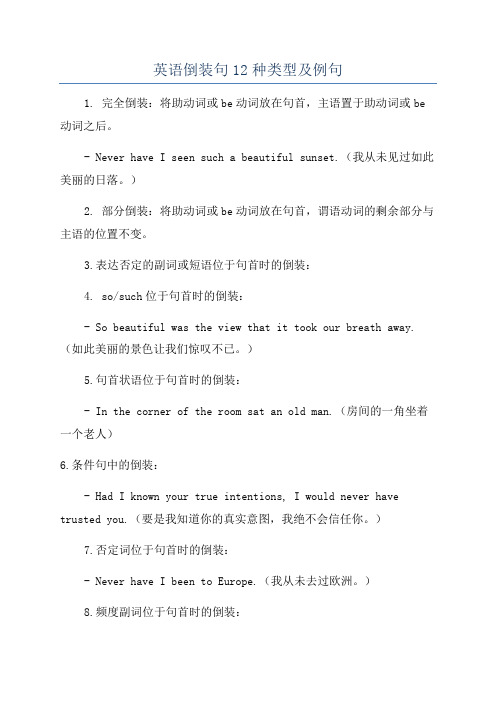
英语倒装句12种类型及例句1. 完全倒装:将助动词或be动词放在句首,主语置于助动词或be 动词之后。
- Never have I seen such a beautiful sunset.(我从未见过如此美丽的日落。
)2. 部分倒装:将助动词或be动词放在句首,谓语动词的剩余部分与主语的位置不变。
3.表达否定的副词或短语位于句首时的倒装:4. so/such位于句首时的倒装:- So beautiful was the view that it took our breath away.(如此美丽的景色让我们惊叹不已。
)5.句首状语位于句首时的倒装:- In the corner of the room sat an old man.(房间的一角坐着一个老人)6.条件句中的倒装:- Had I known your true intentions, I would never have trusted you.(要是我知道你的真实意图,我绝不会信任你。
)7.否定词位于句首时的倒装:- Never have I been to Europe.(我从未去过欧洲。
)8.频度副词位于句首时的倒装:- Rarely do we see such dedication.(我们很少见到如此的奉献精神。
)9.祈使句或祈使句部分的倒装:- Stand up!(站起来!)- Be quiet, please.(请安静。
)10. only位于句首时的倒装:- Only by working hard can you achieve your goals.(只有通过努力工作,你才能实现目标。
)11.地点状语置于句首时的倒装:- In the garden were beautiful flowers.(花园里有美丽的花朵。
)12.宾语置于句首时的倒装:- A love like this I have never felt before.(我之前从未感受过如此的爱。
英语倒装句的归纳总结顺口溜
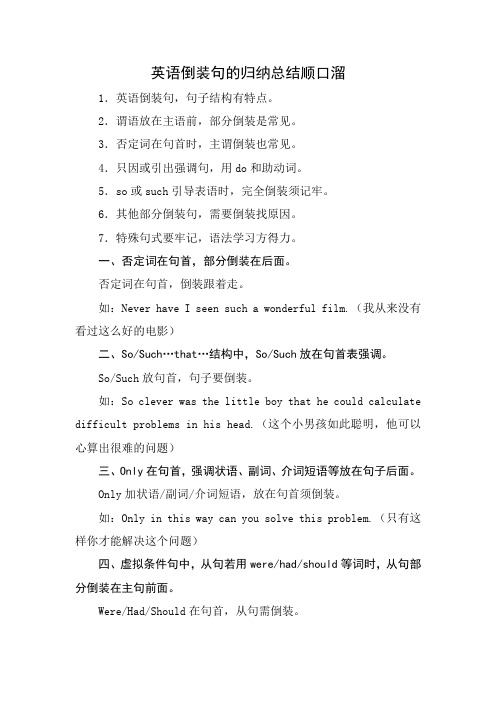
英语倒装句的归纳总结顺口溜1.英语倒装句,句子结构有特点。
2.谓语放在主语前,部分倒装是常见。
3.否定词在句首时,主谓倒装也常见。
4.只因或引出强调句,用do和助动词。
5.so或such引导表语时,完全倒装须记牢。
6.其他部分倒装句,需要倒装找原因。
7.特殊句式要牢记,语法学习方得力。
一、否定词在句首,部分倒装在后面。
否定词在句首,倒装跟着走。
如:Never have I seen such a wonderful film.(我从来没有看过这么好的电影)二、So/Such…that…结构中,So/Such放在句首表强调。
So/Such放句首,句子要倒装。
如:So clever was the little boy that he could calculate difficult problems in his head.(这个小男孩如此聪明,他可以心算出很难的问题)三、Only在句首,强调状语、副词、介词短语等放在句子后面。
Only加状语/副词/介词短语,放在句首须倒装。
如:Only in this way can you solve this problem.(只有这样你才能解决这个问题)四、虚拟条件句中,从句若用were/had/should等词时,从句部分倒装在主句前面。
Were/Had/Should在句首,从句需倒装。
如:Should it rain tomorrow,we wouldn't be able to go on the hiking trip.(如果明天下雨的话,我们就不可能去徒步旅行了)五、让步状语从句中,as/though引导的从句表强调放在句首时需要倒装。
as/though表强调,引导从句须倒装。
如:Though he is a child,he knows a lot of knowledge.(虽然他还是个孩子,但他知道很多知识)。
倒装句的用法归纳

倒装句的用法归纳
倒装句的用法主要包括完全倒装和部分倒装。
完全倒装是指将句子中的谓语动词全部置于主语之前,常见的结构有:
1. 当句首是表示地点、时间、方位的副词,如here、there、in、up、down、on、out、back、then、away、off、over等,而谓语动词是rush、run、come、go、fly等不及物动词时,用全部倒装结构,此时的谓语动词不需要助动词。
例如:Out rushed the children.
2. 表示地点的介词短语位于句首时。
例如:On the wall hang two large portraits.
3. 当such置于句首时。
例如:Such are the facts, no one can deny them. 其中such当作表语.
4. 直接引语的部分或全部位于句首时,点明说话人的部分主谓语要倒装。
例如:“What are you doing?”asked she .
5. 在某些表示祝愿的句子中。
例如:Long live our great country!伟大的祖国万岁!
部分倒装是指将谓语的一部分如助动词或情态倒装至主语之前。
如果句中的谓语没有助动词或情态动词,则需添加助动词do, does或did,并将其置于主语之前。
以上信息仅供参考,如有需要,建议查阅语法书籍或咨询英语教师。
倒装句语法大全
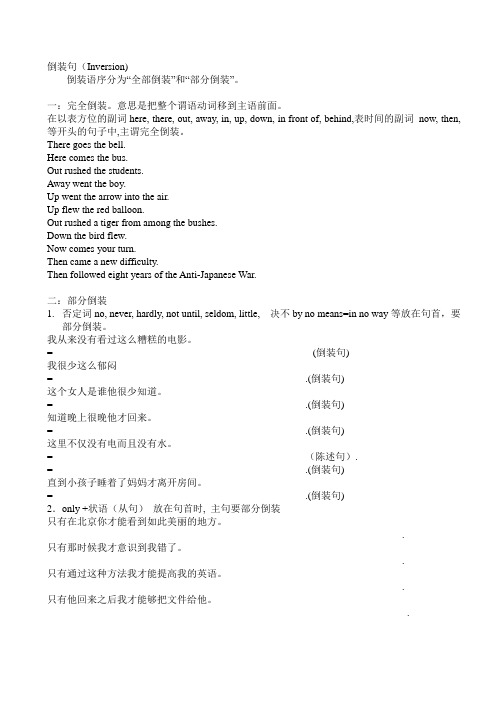
倒装句(Inversion)倒装语序分为“全部倒装”和“部分倒装”。
一:完全倒装。
意思是把整个谓语动词移到主语前面。
在以表方位的副词here, there, out, away, in, up, down, in front of, behind,表时间的副词now, then,等开头的句子中,主谓完全倒装。
There goes the bell.Here comes the bus.Out rushed the students.Away went the boy.Up went the arrow into the air.Up flew the red balloon.Out rushed a tiger from among the bushes.Down the bird flew.Now comes your turn.Then came a new difficulty.Then followed eight years of the Anti-Japanese War.二:部分倒装1.否定词no, never, hardly, not until, seldom, little, 决不by no means=in no way等放在句首,要部分倒装。
我从来没有看过这么糟糕的电影。
=____________________________________________________(倒装句)我很少这么郁闷= __________________________________________________.(倒装句)这个女人是谁他很少知道。
= __________________________________________________.(倒装句)知道晚上很晚他才回来。
= __________________________________________________.(倒装句)这里不仅没有电而且没有水。
英语倒装句12种类型及例句
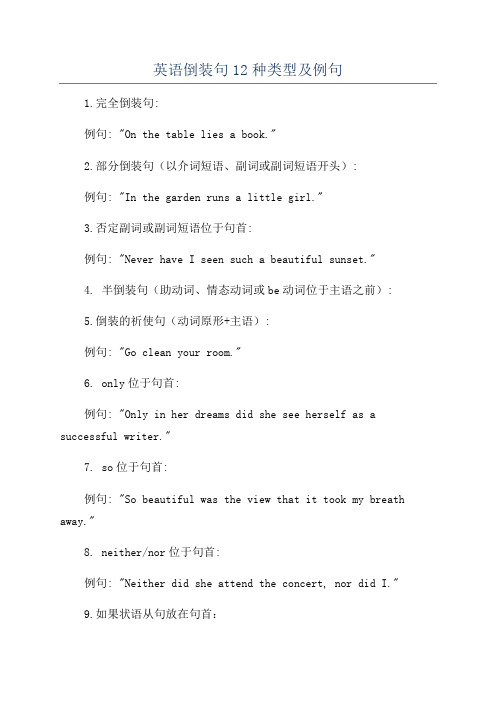
英语倒装句12种类型及例句1.完全倒装句:例句: "On the table lies a book."2.部分倒装句(以介词短语、副词或副词短语开头):例句: "In the garden runs a little girl."3.否定副词或副词短语位于句首:例句: "Never have I seen such a beautiful sunset."4. 半倒装句(助动词、情态动词或be动词位于主语之前):5.倒装的祈使句(动词原形+主语):例句: "Go clean your room."6. only位于句首:例句: "Only in her dreams did she see herself as a successful writer."7. so位于句首:例句: "So beautiful was the view that it took my breath away."8. neither/nor位于句首:例句: "Neither did she attend the concert, nor did I."9.如果状语从句放在句首:10.条件从句位于句首:例句: "Should he fail the exam, he will have to retake the course."11.介词短语或副词短语位于句首:例句: "In the corner sat a small dog."12. or/ nor引导的短语或句子位于句首:。
全面的倒装句总结
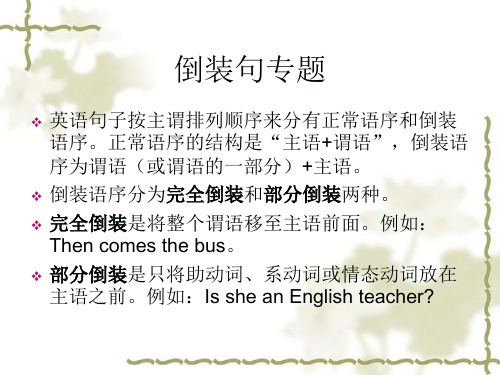
(二)含有否定意义的连词放句首: 含有否定意义的连词放句首 not only…but also.., neither.. nor.., no sooner…than..,scarely.. than.., hardly.. when.., not until... 注意: 注意 1) not until 引出主从复合句,主句倒装, 主句倒装, 主句倒装 从句不倒装。 从句不倒装 2)not only, no sooner,hardly,scarely 要倒, but (also),than, when后面的句 子不倒。 3)neither...nor..两部分都倒装。
(七)虚拟条件句的倒装 虚拟条件句的倒装 虚拟条件句的从句部分如果含有 were, should, 或 had, 可将 if 省略,再把 were, should 或 had 移到从句句首,实行倒装 。 ---Were they here now,they could help us. =If they were here now, they could help us. ----Had you come earlier,you would have met him =If you had come earlier, you would have met him. ---Should it rain,the crops would be saved. =Were it to rain,the crops would be saved.
---Oh,yes. Has the teacher come yet? ---Look! Here________. A the bell goes, is he coming B goes the bell, he comes C the bell is going, he is coming D goes the bell, comes he
倒装句的用法归纳总结

倒装句的用法归纳总结一、完全倒装完全倒装通常只用于一般现在时和一般过去时,常见的结构有:1. 表示时间now,then等或方位here,there,up,down,in,out,away,off,inside,outside等的副词,以及表示地点的介词短语in the room,on the wall 等置于句首,且主语为名词时,句子要用完全倒装结构。
主语为人称代词时不倒装。
There goes the bell.Then came the chairman.At the foot of the mountain lies a village,where people still livea peaceful life.Ahead sat an old woman.Here he comes. Away they went.二、部分倒装1. only所修饰的副词/介词短语/状语从句位于句首时(作状语用)Only in this way, can you learn English well.Only when you are a parent will you understand how I feel now.2. never, hardly, seldom, scarcely, little,not…until, not, no, by no mean, at no time等否定意义的词位于句首时Never have I seen such a performance.Nowhere will you find the answer to this question.Not until the child fell asleep did the mother leave the room.No sooner had they arrived at home than it began to rain heavily.注意:not only…but also连接并列分句时,not only部分要倒装(连接主语时不倒装)Not only did he refuse the gift, he also severely criticized the sender.3. so…that中so或such…that中such位于句首时So frightened was he that he dared not go home alone.Such a careless girl was she that he made the mistake a third time.4. so位于句首表示前句的内容也同样适用于后一个人或物时(只能是肯定句,且前后两句主语不同); neither/nor用于句首,表示前句的否定内容也适用于后一句的人/物时(只能用于否定句,且前后两句主语不同)He likes chatting. So does his wife.If you won't go, neither will I.5. 在虚拟语气中,如果if条件从句有系动词were或助动词should/had,可以把其置于句首,同时省去if.Were it to rain, we would cancel the plan.。
英语倒装句的用法归纳总结
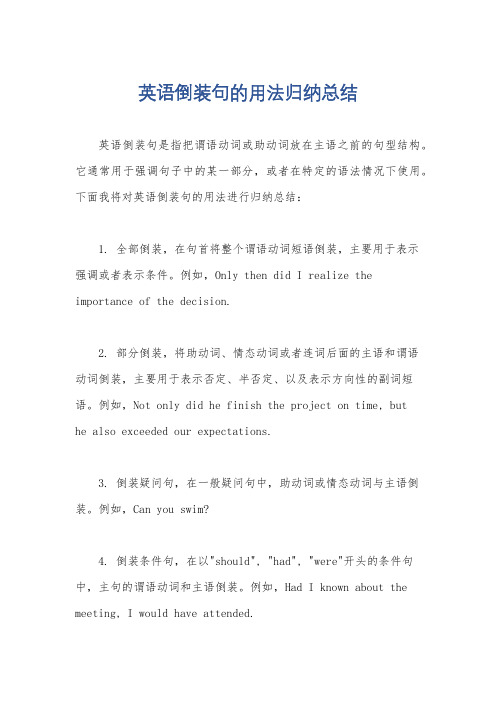
英语倒装句的用法归纳总结
英语倒装句是指把谓语动词或助动词放在主语之前的句型结构。
它通常用于强调句子中的某一部分,或者在特定的语法情况下使用。
下面我将对英语倒装句的用法进行归纳总结:
1. 全部倒装,在句首将整个谓语动词短语倒装,主要用于表示
强调或者表示条件。
例如,Only then did I realize the importance of the decision.
2. 部分倒装,将助动词、情态动词或者连词后面的主语和谓语
动词倒装,主要用于表示否定、半否定、以及表示方向性的副词短语。
例如,Not only did he finish the project on time, but
he also exceeded our expectations.
3. 倒装疑问句,在一般疑问句中,助动词或情态动词与主语倒装。
例如,Can you swim?
4. 倒装条件句,在以"should", "had", "were"开头的条件句中,主句的谓语动词和主语倒装。
例如,Had I known about the meeting, I would have attended.
5. 倒装句型用于表示方向性的副词短语,如,Here comes the bus.
总的来说,英语倒装句的使用有一定的规律,主要用于强调、
条件句、疑问句和特定的副词短语。
在写作和口语表达中,合适地
运用倒装句可以使语言更加生动有力。
希望以上总结对你有所帮助。
(完整版)英语倒装句的用法归纳

英语部分倒装用法归纳1. 否定副词位于句首时的倒装在正式文体中,never, seldom, rarely, little, hardly, scarcely, no sooner, no longer, nowhere 等含有否定意义的副词若位于句首,则其后要用部分倒装:I shall never forgive him. / Never shall I forgive him. 我永远不会宽恕他。
He seldom goes out for dinner. / Seldom does he go out for dinner. 他很少出去吃饭。
She hardly has time to listen to music. / Hardly does she have time to listen to music. 她几乎没时间听音乐。
He little realizes how important this meeting is. / Little does he realize how important this meeting is. 他不甚明白这个会议的重要性。
We had no sooner reached the airport than the plane took off. / No sooner had we reached the airport than the plane took off. 我们刚到机场,飞机就起飞了。
【注意】(1) 对于not…until句型,当not until…位于句首时,其后的主句要用倒装语序:He didn’t leave the ro om until the rain stopped. / Not until the rain stopped did he leave the room. 雨停了之后他才离开这房间。
(2) 某些起副词作用的介词短语,由于含有否定词,若位于句首,其后要用部分倒装:On no accounts must this switch be touched. 这个开关是绝不能触摸的。
倒装句用法知识点总结

倒装句用法知识点总结倒装句是英语语法中的一种特殊句型,通过改变主谓语序,使得句子结构更加灵活且具有强调的效果。
在英语中,倒装句常见于疑问句、条件句、以及某些特定情况下。
本文将对倒装句的用法进行总结和归纳。
一、全倒装句全倒装句是指将助动词或情态动词放在主语之前,与否定词或者表示否定意义的副词连用。
全倒装句的结构如下:1. 在一般疑问句中,将助动词放在主语之前。
例如:- Do you like apples? (你喜欢苹果吗?)- Can he swim? (他会游泳吗?)2. 在以疑问代词引导的特殊疑问句中,将助动词放在主语之前。
例如:- What did you eat for breakfast? (你早餐吃了什么?)- Where can we find the nearest restroom? (我们可以在哪里找到最近的洗手间?)3. 在以否定词或表示否定意义的副词开头的句子中,将助动词放在主语之前。
例如:- Never have I seen such a beautiful sunset. (我从未见过如此美丽的日落。
)- Not only did she study hard, but she also achieved excellent results. (她不仅学习刻苦,而且取得了优异的成绩。
)二、部分倒装句部分倒装句是指将助动词、情态动词、或者动词本身的某种形式放在句首,与主语之间倒装。
部分倒装句的结构如下:1. 在以否定副词开头的句子中,将助动词或情态动词放在句首。
例如:- Rarely do I go to bed before midnight. (我很少在午夜前睡觉。
)- Seldom has he been to the countryside. (他很少去过农村。
)2. 在以表示“否定”“否认”“无法”等意义的副词开头的句子中,将情态动词、助动词或谓语动词的某种形式放在句首。
倒装句的形式与用法归纳

倒装句的形式与用法归纳倒装句是英语语法中常见且重要的句子结构。
它的形式是将主语和谓语之间的语序颠倒,以达到特定的语法和修辞效果。
本文将对倒装句的形式与用法进行归纳总结。
一、完全倒装句完全倒装句的结构是将谓语动词完全移到主语之前。
主要有以下几种情况:1. 当句子以地点副词或介词短语作为状语开头时,常用完全倒装句。
例如:- In the garden stood a beautiful statue.(园子里有一尊漂亮的雕像。
)- Under the tree sat the old man.(树下坐着那位老人。
)2. 当句子以表示否定意义的副词或副词短语开头时,常用完全倒装句。
例如:- Never have I seen such a beautiful sunset.(我从未见过如此美丽的日落。
)- Not only does he speak English, but also French.(他不仅会说英语,还会说法语。
)3. 当句子以表示方式或条件的副词或副词短语开头时,常用完全倒装句。
例如:- In this way can we solve the problem.(只有这样我们才能解决这个问题。
)- Only when you work hard will you succeed.(只有努力工作,你才会成功。
)二、部分倒装句部分倒装句是将助动词、情态动词或be动词移至主语之前,形成倒装的句子结构。
常见情况如下:1. 当句子以否定词开头时,常用部分倒装句。
例如:- I didn't realize until later that I had made a mistake.(直到后来我才意识到我犯了个错。
)- She couldn't sleep because of the noise.(由于噪音她无法入睡。
)2. 当句子以“so + 形容词/副词+ that”开头时,常用部分倒装句。
倒装句语法总结英语
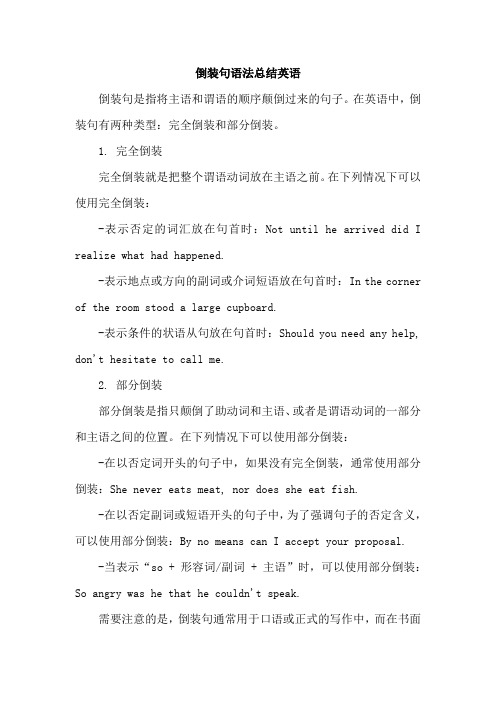
倒装句语法总结英语
倒装句是指将主语和谓语的顺序颠倒过来的句子。
在英语中,倒装句有两种类型:完全倒装和部分倒装。
1. 完全倒装
完全倒装就是把整个谓语动词放在主语之前。
在下列情况下可以使用完全倒装:
-表示否定的词汇放在句首时:Not until he arrived did I realize what had happened.
-表示地点或方向的副词或介词短语放在句首时:In the corner of the room stood a large cupboard.
-表示条件的状语从句放在句首时:Should you need any help, don't hesitate to call me.
2. 部分倒装
部分倒装是指只颠倒了助动词和主语、或者是谓语动词的一部分和主语之间的位置。
在下列情况下可以使用部分倒装:
-在以否定词开头的句子中,如果没有完全倒装,通常使用部分倒装:She never eats meat, nor does she eat fish.
-在以否定副词或短语开头的句子中,为了强调句子的否定含义,可以使用部分倒装:By no means can I accept your proposal.
-当表示“so + 形容词/副词 + 主语”时,可以使用部分倒装:So angry was he that he couldn't speak.
需要注意的是,倒装句通常用于口语或正式的写作中,而在书面
语中很少使用。
英语倒装句的归纳总结
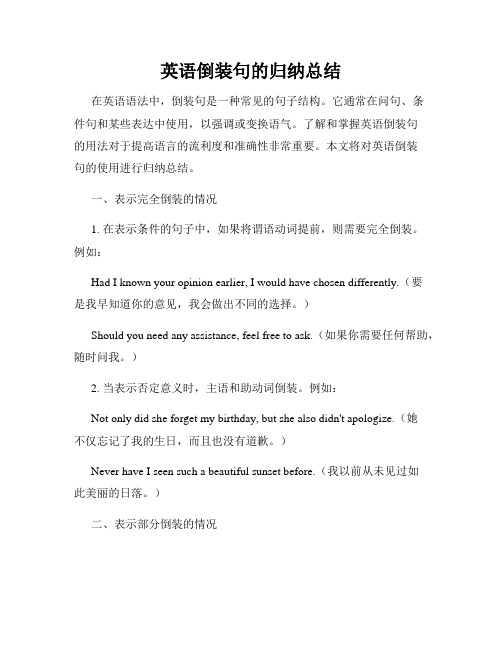
英语倒装句的归纳总结在英语语法中,倒装句是一种常见的句子结构。
它通常在问句、条件句和某些表达中使用,以强调或变换语气。
了解和掌握英语倒装句的用法对于提高语言的流利度和准确性非常重要。
本文将对英语倒装句的使用进行归纳总结。
一、表示完全倒装的情况1. 在表示条件的句子中,如果将谓语动词提前,则需要完全倒装。
例如:Had I known your opinion earlier, I would have chosen differently.(要是我早知道你的意见,我会做出不同的选择。
)Should you need any assistance, feel free to ask.(如果你需要任何帮助,随时问我。
)2. 当表示否定意义时,主语和助动词倒装。
例如:Not only did she forget my birthday, but she also didn't apologize.(她不仅忘记了我的生日,而且也没有道歉。
)Never have I seen such a beautiful sunset before.(我以前从未见过如此美丽的日落。
)二、表示部分倒装的情况1. 在使用否定副词或短语(如never, seldom, hardly, little, nowhere等)引导的句子中,形容词或副词位于句首,主语和谓语动词部分倒装。
例如:Hardly had I started my work when the phone rang.(我刚开始工作,电话就响了。
)Never before have I heard such a beautiful song.(我以前从未听过如此美妙的歌。
)2. 在以only开头的句子中,only位于句首时,主语和谓语动词部分倒装。
例如:Only by working hard can you achieve your goals.(只有通过努力工作,你才能实现目标。
倒装句用法归纳

1. 否定副词位于句首时的倒装2. 在正式文体中,longer, nowhere 等含有否定意义副词若位于句首,则其后要用部分装:3. I shall never forgive him. / Never shall I forgive him. 我永远不会宽恕他。
4. He seldom goes out for dinner. / Seldom does he go out for dinner. 他很少出去吃饭。
5. She hardly has time to listen to music. / Hardly does she have time to listen to music. 她几乎没时间听音乐。
6. He little realizes how important this meeting is. / Little does he realize how important this meeting is. 他不甚明白这个会议的重要性。
7. We had no sooner reached the airport than the plane took off. / No sooner had we reached the airport than the plane took off. 我们刚到机场,飞机就起飞了。
8. 【注意】9. (1) 对于 not…until 句型,当 not until…位于句首时,其后的主句要用倒装语序:10. He didn’t leave the room until the rain stopped. / Not until the rainstopped did he leave the room. 雨停了之后他才离开这房间。
11. (2) 某些起副词作用的介词短语,由于含有否定词,若位于句首,其后要用部分倒装:12. On no accounts must this switch be touched. 这个开关是绝不能触摸的。
英语的倒装句整理归纳

英语的倒装句整理归纳英语倒装句句型的结构有两种:部分倒装和完全倒装。
一、部分倒装部分倒装其实也很简单,我们只需要记住,它完全和疑问句结构一样,要把谓语的一部分(即系动词be;助动词do, have,be, will;情态动词can, must should等)提到主语之前。
Not only is he humorous, but he is also kind to the kids.他不仅幽默,而且对孩子们也很好。
Seldom does the boy eat lamb.这个男孩很少吃羊肉。
Little can we do to help the poor man.我们帮不了这个可怜的人。
部分倒装具体情况:1,否定词never及部分否定词rarely和seldom在句首:Never have I been felt so frustrated!我从来没有这么沮丧过!Seldom has she done anything more foolish.她很少干过比这更愚蠢的事。
注意,句子中往往是完成时态且可能含有比较级。
2,部分否定词hardly, barely, no sooner, or scarcely在句首:No sooner had she got in the bath than the doorbell rang.她刚开始洗澡,门铃响了。
No sooner had we reach the bus station than the bus came.我们一到公共汽车站,公共汽车就来了。
Barely had I closed the door when the phone rang.我刚关上门,电话就响了。
注意,这类句子中一般有先后接连发生的两个动作。
所以从主句多用过去完成时。
3, 部分否定词Little在句首:Little have I read about archeology.我很少读考古学方面的东西。
英语倒装句的归纳总结
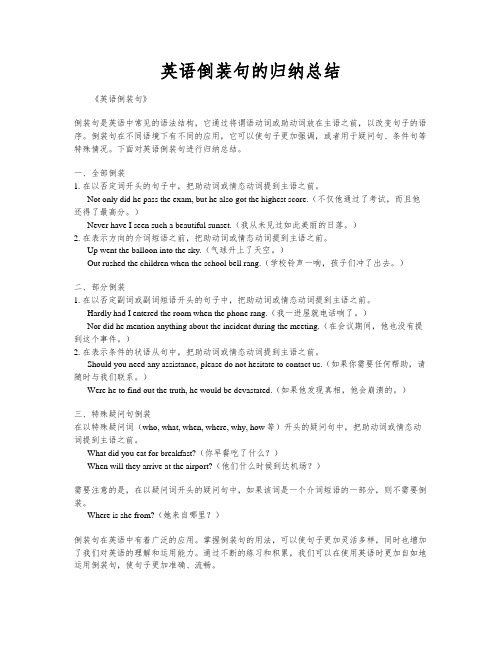
英语倒装句的归纳总结《英语倒装句》倒装句是英语中常见的语法结构,它通过将谓语动词或助动词放在主语之前,以改变句子的语序。
倒装句在不同语境下有不同的应用,它可以使句子更加强调,或者用于疑问句、条件句等特殊情况。
下面对英语倒装句进行归纳总结。
一、全部倒装1. 在以否定词开头的句子中,把助动词或情态动词提到主语之前。
- Not only did he pass the exam, but he also got the highest score.(不仅他通过了考试,而且他还得了最高分。
)- Never have I seen such a beautiful sunset.(我从未见过如此美丽的日落。
)2. 在表示方向的介词短语之前,把助动词或情态动词提到主语之前。
- Up went the balloon into the sky.(气球升上了天空。
)- Out rushed the children when the school bell rang.(学校铃声一响,孩子们冲了出去。
)二、部分倒装1. 在以否定副词或副词短语开头的句子中,把助动词或情态动词提到主语之前。
- Hardly had I entered the room when the phone rang.(我一进屋就电话响了。
)- Nor did he mention anything about the incident during the meeting.(在会议期间,他也没有提到这个事件。
)2. 在表示条件的状语从句中,把助动词或情态动词提到主语之前。
- Should you need any assistance, please do not hesitate to contact us.(如果你需要任何帮助,请随时与我们联系。
)- Were he to find out the truth, he would be devastated.(如果他发现真相,他会崩溃的。
- 1、下载文档前请自行甄别文档内容的完整性,平台不提供额外的编辑、内容补充、找答案等附加服务。
- 2、"仅部分预览"的文档,不可在线预览部分如存在完整性等问题,可反馈申请退款(可完整预览的文档不适用该条件!)。
- 3、如文档侵犯您的权益,请联系客服反馈,我们会尽快为您处理(人工客服工作时间:9:00-18:30)。
英语倒装句的用法类型1)部分倒装——助动词\情态动词+主语+谓语的实义动词型2)全倒装——谓语+主语型一、在以下结构中用全倒装:这种结构通常只用于一般现在时和一般过去时。
常见的结构有:1.在there be或者There live(stand,appear.seem,remain,exist….) 句型中;如:There are thousands of people on the square. 原语序:Thousands of people are there on the square. There lived an old fisherman in the village. 原语序:An old fisherman lived there in the village. There stands a little girl. 正常语序:A little girl stands there.2.在“here, there, now, thus, then+动词+主语”的句子中,(谓语动词为be, go, come, lie, run等,主语为名词);Now comes my turn. There goes the bell. Then came the order to leave.Here comes a bus= A bus comes here.3.在“out\ in, up\ down, off\away,in the distance,on the hill,round the corner”等表示方向性的副词或表示地点的介词词组位于句首,且主语又是名词,谓语是表示运动的动词。
Away went the crowed one by one. In came a stranger in black.Out rushed the children.. Down fell the leaves. On the floor were piles of old books.☆注意:主语必须是名词eg: Out she went.There they are. Here he comes. 而Out went the girl. Here comes the boy.4.有时为了强调表语,构成“表语+连系动词+主语”结构;Lucky is she who was chosen to be a leader.=She who was chosen to be a leader is lucky.Gone are the days when women were looked down upon! =The days when women were looked down upon are gone!5、在某些表示愿望的祝愿语中,全倒装。
Long live the People's Republic of China! May you be happy!二、在以下结构中用部分倒装部分倒装是指将谓语的一部分如助动词或情态倒装至主语之前。
如果句中的谓语没有助动词或情态动词,则需添加助动词do, does或did,并将其置于主语之前。
1.含有否定或半否定意义的词语(如:not,never,seldom,hardly,little,scarcely,barely,few…);或者含有否定结构的连词(not only…but also.., neither..nor.., no sooner had…than...(一。
就。
),scarely..than.., Hardly had...when.., not until...;nowhere等);或否定意义的介词词组(by no means(决不),in no case\way(任何情况下都不),with no method, at no time(决不), on no account(决不),under no circumstances\condition...(任何情况下都不))位于句首eg: I have never seen him before.=Never have I seen him before.Not a word did he say when he left. Seldom/Scarecely does he go to that park.Hardly(几乎不。
) do I speak to him. Little English can he speak.Little does he realize the importance of the meeting. Few people did I see in the street.含有否定结构的连词:eg:1)Not only can he play basketball, but also I can.2)No sooner had we arrived home than it began to rain.3)Hardly had we met our friends when the train left.4)Not until the baby fell asleep did the mother leave the room.(主句倒装,从句不倒装)=The mother didn’t leave the room until the baby fell asleep.注意:1)Not only...but also...必须连接两个分句时,才使用部分倒装。
而且只倒装not only后的分句。
如果连接的是两个并列词语,不用倒装结构。
如:Not only his father but also I like reading.2)Hardly...when..., Scarcely...than..., No sooner...than...意义基本相同,它们连接的句子,都只倒装前一个分句,即:“前倒后不倒(装)”。
3)当not until(直到。
才)引导主从复合句时,主句倒装,从句不用倒装,或者可以理解为:“后倒前不倒(装)”。
含有否定意义的介词词组:如:By no means should we tell lies. On no account should we let him leave.At no time(决不)will I get married to you. In (Under) no circumstances will I lend money to him.注意:in no time(立即,马上)位于句首时,其后无需用倒装语序:In no time he worked out the problem. 他马上就算出了那道题。
2.only+副词;或介词短语;或状语从句时,主句倒装;eg: Only in this way can you use the computer well. (only+介词短语)Only yesterday did he find out that his watch was missing.(only+副词)Only when it began to rain did he finish his job.(only+状语从句)3.so用在句首,表示另一主语“也。
样”时,用“So + be(have,助动词或情态动词)+主语”结构;而表示另一主语“也不。
样”时,用“Nor\Neither + be(have,助动词或情态动词)+主语”结构;注意:若是对上文同一主语的情况进行强调时,不倒装。
句型为“So+主语+be或do(did)/have ”。
He went to school yesterday, so did I.---David has made great progress recently. --So he has, and so have you.He hasn't finished his homework, and nor have I. 特别注意:If you won't go, neither/nor willI.4.as 作“尽管/虽然”,引导让步状语从句(as可以换成though),由于语法需要,需要部分倒装。
Shortest as/though she is, she is not the fattest.(倒装后,最高级前不用冠词)Child as he is, he knows a lot.(倒装后,单数名词前不用a)Fail as I did, I would try again.(倒装后,实义动词提前,在主语后添加助动词。
)Hard as he tried, he didn't pass the exam.(副词提到句首)注意:though位于句首引导让步状语从句时,可以倒装,也可以不倒装。
但as引导让步状语从句时,必须使用倒装。
否则就变成了原因状语从句。
eg:As he is too young, he couldn't go to school.5.在”so…that…”和”such…that…”引导的结果状语从句中,当so和such位于句首时,用”so\such + ... +部分谓语+ 主语+...”;So difficult was the exam that most of the students failed to pass it.=The exam was so difficult that most of the students failed to pass it.6.若if 引导的虚拟条件句中有were, had, should 时,可将if省略,把were, had , should 放在句首。
1)Should it rain tomorrow, we would not play basketball.=If it should rain tomorrow, we would not play basketball.2)Had I prepared well, I couldn't have lost the job.=If I had prepared well, I couldn't have lost the job.3) Were he to come tomorrow, I would go to meet him at the airport.=If he were to come tomorrow, I would go to meet him at the airport.倒装句练习题1. Not until I began to work ____ how much time I had wasted.A. didn't I realizeB. did I realizeC. I didn't realizeD. I realized2. Only by practising a few hours every day ____ be able to master the language.A. you canB. can youC. you willD. will you3. If you don't go, neither ____.A. shall I B. do I C. I do D. I shall4. No sooner ____ to the station ____ the train left.A. had I got, whenB. I had got, thanC. had I got, thanD. did I get, when5. — Your father is very strict with you. —_____ He never lets off a single mistake of ours.A. So he isB. So is heC. He is soD. So does he6. ____ today, he would get there by Sunday.A. Would he leaveB. Was he leavingC. Were he to leaveD. If he leave7. Never in my life ____ such a thing.A. I have heard or have seenB. have I heard or seenC. I have heard or seenD. did I hear or see8. —— Here ____! Where is Xiao Liu?There ____.A. comes the bus, is heB. comes the bus, he isC. the bus comes, is heD. the bus comes,he is9. ____ ,I will not buy it.A. Much as do I like itB. As much I like itC. Much as I like itD. As I like it much10. —— I like football. I don't like volleyball. ____.A. So do IB. Neither do IC. So it is with meD. So is it with me11. _____ the expense, I _____ to Italy.A. If it were not, goB. Were it not for\would goC. Weren't it for\will goD. If it hadn't been\would have gone12. So _____ in the darkness that he didn't dare to move an inch.A. he was frightenedB. was he frightenedC. frightened he wasD. frightened was he13. -- In modem times, girls like beautiful clothes.--Yes, _____ and_____ After all, our life has greatly improved.A. so do they, so do youB. so they do, so you doC. so do they, so you doD. so they do,so do you14. —— You have an English class every day except Sunday. _____.A. So we haveB. So we doC. So have weD. So do we15. I wonder if your wife will go to the ball. If your wife _____, so _____ mine.A. does, willB. will, doesC. will, wouldD. does, do16. Only after I read the text over again _____ its main idea.A. that I knewB. did I knewC. 1 could knowD. I did know17--You seem to have learned all the English words by heart. -- _____ .A. So l doB. So do lC. So I haveD. So have I18. -- I seldom watch TV, but listen to the radio a lot. --_____ .A. So do IB. Neither do IC. I m the sameD. So it is with me19. So excited _____ that he couldn't say a word.A. he seemedB. did he seemC. was he seemingD. he did look20. Jimmy was so nervous not a single word _____ down in the dictation.A. he wroteB. he was writtenC. did he writeD. was he written21. Little ______ when 1 took the trip where it would lead me.A. have I knownB. had I knownC. do 1 knowD. did I know22. -- Have you ever seen anything like that before?---- ____.A. No, I never have seen anything like that beforeB. No, never I have seen anything like that beforeC. No, never have 1 seen anything like that beforeD. No, I have seen anything like that before never23. _____ ,1 would accept the invitation and go to the party.A. Were I youB. Was I youC. Had I been youD. Would 1 be you24. You should work less _____.A. and neither should IB. and so should IC. and nor should ID. and so I should25. _____ and caught the mouse.A. Up the cat jumpedB. The cat up jumpedC. Up jumped the catD. Jumped up the cat26. Not only _____ a promise, but also he kept it.A. did he makeB. he madeC. does he makeD. has he made27. His uncle is a worker and has been working in the factory for more than ten years. _____.A. So is his auntB. So has his auntC. So his aunt doesD. So it is with his aunt28. Not once _____ their plan.A. did they changeB. they changedC. changed theyD. they did change29. -- Do you know Jim quarreled with his brother?-- I don't know, and ______ .A. nor don't I careB. nor do I careC. I don't care neitherD. I don't care also30. Not until he arrived home _____ he find that this wallet had been stolen.A. didB. wouldC. whenD. that31. --This is one of the oldest trees in the world. _____ such a big tree.A. Never I have seenB. I haven't never seenC. Never have I seenD. I have seen never32. Nowhere else in the world _____ cheaper tailoring(裁缝业,成衣业)than in Hong Kong.A. a tourist can findB. can a tourist findC. a tourist will findD. a tourist has found33._____ succeed in doing anything.A. Only by working hard we canB. By only working hard we canC. Only we can by working hardD. Only by working hard can we34._____ that we all went out, lying in the sun.A. So fine was the weatherB. So was the fine weatherC. The weather was so fine wasD. So the weather was tine35. ____ a nice man ____ that we all believe him.A. So, did he seemB. So, he seemedC. Such, he seemedD. Such, did he seem36. --You seem to be an actor. --___ . I have played many parts in a lot of films.A. So do IB. So am IC. So I doD. So I am37. Not only ____ working hard, but also ____ very polite.A. the boy is, he isB. is the boy, he isC. the boy is, is heD. is the boy, is he38. ____, he never seems able to do the work beautifully.A. Try as he doesB. As he triesC. Try as does heD. As try he does39.-- I cannot see the picture well from here.---- _____.A. Neither can t IB. Neither I canC. I can't neitherD. Neither can I40.--You ought to have given them some advice ---- _____, but who cared what I asked?A. So ought youB. So 1 oughtC. So it wasD. So I did41. So carelessly _____ that he almost killed himself.A. he drivesB. does he driveC. did he driveD. he drove42. Little _____ about his own health though he was very ill.A. he caredB. did he careC. he caresD. does he care43. Well ____ know him and well ____ know me.A. I did, he didB. did I, he didC. did I, did heD. I did, did he44. No sooner ____ they rushed out into the street.A. did they hear the news thanB. did they hear the news whenC. had they heard the news thanD. had they heard the news when45. Little wonder _____ up their hands in dismay.A. have some thrownB. some have thrownC. thrown some haveD. have thrown some46. ____, he would have passed the exam. A. If he were to studyB. If he studied hardC. Had he studied hardD. Should he study hard47. We were lucky enough, for no sooner _____ home _____ it rained.A. we returned, andB. we had returned, whenC. did we return, whenD. had we returned,than48. So little _____ agree on the plan that they could not settle their difference.A. did theyB. do theyC. they didD. they did not49. _____ he realized it was too late to return home.A. No sooner it grew dark thanB. Hardly did it grow dark whenC. It was not until dark thatD. It was until dark that参考答案1~5 BDACA 6~10 CBBCC 11~15 BDDBA 16~20 BADBC 21~25 DCABC26~30 ADABA 31~35 CBDAD 36~40 DBADD 41~45 CBCCB 46~49 CDAC 友情提示:本资料代表个人观点,如有帮助请下载,谢谢您的浏览!。
